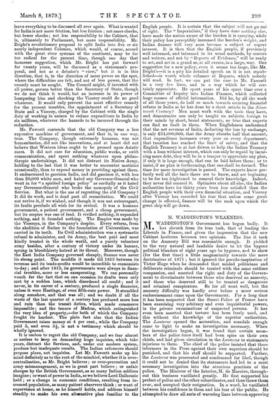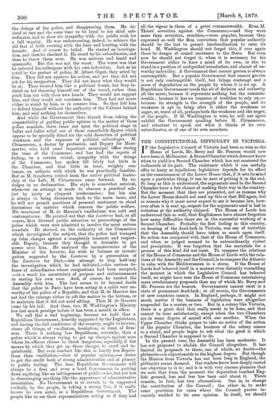M. WADDINGTON'S WEAKNESS.
ltif WADDINGTON'S Government has begun badly. It INI• has shrunk from its true task, that of leading the Liberals in France, and given the impression that the new Cabinet hesitates between two opinions. The line it took on the Amnesty Bill was reasonable enough. It yielded to the very natural and laudable desire to let the bygone political blunders of eight years ago be bygones, and to show (for the first time) a little magnanimity towards the mere doctrinaires of 1871 ; but it ignored the pseudo-inspiration of Victor Hugo when he demanded that misled politicians and deliberate criminals should be treated with the same sublime compassion, and asserted the right and duty of the Govern- ment to discriminate between those who deserved an amnesty, and those who deserved still to be treated as dangerous and criminal conspirators. So far all went well, but the amnesty difficulty was hardly over before a more serious embarrassment came upon the Government. For a long time it has been suspected that the Secret Police of France have been exercising very arbitrary and even inquisitorial powers, in the private examinations of suspected persons. It has even been asserted that torture has been freely used, and this without the knowledge of the superior authorities. The Lanterne opened the accusation, and scandals enough came to light to make an investigation necessary. When the investigation began, it was found that certain mem- bers of the police force itself had been spies on their own chiefs, and had given circulation in the Lanterne to statements injurious to them. The chief of the police insisted that these informers in the Press against their own superiors should be punished, and that his staff should be supported. Further, the Lanterne was prosecuted and condemned for libel, though it could not be denied that its statements had led to a most necessary investigation into the atrocious practices of the police. The Minister of the Interior, M. de Marcere, through- out this business vacillated greatly. He first supported his prefect of police and the other subordinates, and then threw them over, and accepted their resignation. In a word, he vacillated between his confidence in them and his fear of the public. He attempted to draw all sorts of wavering lines between approving the doings of the police, and disapproving them. He de- sired at one and the same time to be loyal to his chief sub- ordinates, and to show his sympathy with the public wish for a full inquiry. He was endeavouring, indeed, to achieve the old feat of both running with the hare and hunting with the hounds. And of course he failed. He started an investiga- tion, and then he checked it. He stood by his subordinates, and then he threw them over. He was nervous and timid and spasmodic. But this was not the worst. The worst was that he infected his colleagues with his own indecision. Just as he acted by the prefect of police, M. Albert Gigot, they acted by him. They did not approve his action, and yet they did not ask for his resignation. They did not know what they would be at. They treated him like a political Jonah, but they in- sisted on his throwing himself out of the vessel, rather than pitch him out with their own hands. They would not support him, and they would not condemn him. They had not nerve either to stand by him, or to censure him. So they left him to defend himself without the authority of the Cabinet behind him, and said nothing for themselves. And while the Government thus shrank from taking the responsibility of guiding public opinion in the matter of these police scandals, there came out upon the political stage in fuller and fuller relief one of those remarkable figures which appear to be specially fitted for the cold dissection of political weakness and the exposure of political subterfuges. M. Clemenceau, a doctor by profession, and Deputy for Mont- martre, who held some important municipal office during the time of the Commune, and has had the repute of feeling, to a certain extent, sympathy with the doings of the Commune, has spoken till lately but little in the Chamber, and that little in terse, weighty sen- tences, on subjects with which he was practically familiar. But as M. Gambetta retired from the active political leader- ship of the Left, M. Clemenceau came forward. He in- dulges in no declamation. His style is somewhat satirical, whenever an attempt is made to obscure a practical sub- ject by misty or eloquent irrelevancies ; but his aim is always to bring discussion back to the main issue, and he will not permit questions of personal sentiment to cloud discussions on matters which concern the public welfare. His treatment of M. de Marcere's vacillations was cold and contemptuous. He pointed out that the Lanterne had, at all events, first directed public attention to proceedings of the police which were now admitted to involve the most serious scandals. He showed, on the authority of the Committee which investigated the subject, that the police had trumped up false charges against a completely innocent and respect- able Deputy, because they thought it desirable to get power over him. He analysed the inconsistencies of the Minister of the Interior, his wish to balance an investi- gation suggested by the Lanterne by a prosecution of the Lanterne for libel,—his attempt to stop half-way the investigation which he had initiated,—his curious de- fence of subordinates whose resignations had been accepted, —in a word, his uncertainty of purpose and embarrassment in stating his own case. And, of course, he carried the Assembly with him. The fact seems to be beyond doubt that the police in Paris have been acting in a spirit very un- worthy of the police of a Republic, and that M. de Marcere has not had the courage either to sift the matter to the bottom, or to maintain that it did not need sifting. Thus M. de Marcere came by his fall. And thus, too, M. Waddington's Ministry has lost much prestige before it has been a month in office. We call this a bad beginning, because we hold that a Republican Government, heartily supported by the Legislature, and having the full confidence of the country, ought to beware, above all things, of vacillation, hesitation, or want of firm- ness. There is nothing less Republican, certainly, than a police which is always trying to get up charges against men whom its officers choose to think dangerous, especially if the means by which they get up these charges be cruel and in- quisitorial. But even conduct like this is hardly less Repub- lican than vacillation,—f ear of popular opinion,—a desire to get the credit both of strong administration and of pliancy to public feeling. The true Republican Government will always be a firm and even a hard Government in putting down anything like an infringement of public order, but not less in discouraging anything like the appearance of administrative irresolution. No Government is so certain to be supported cordially by the people, in taking a strong line, if it really knows its own mind, as a Republican Government. The people like to see their representatives acting as if they had all the vigour in them of a great commonwealth. Even M. Thiers' severities against the Commune,—and they were more than severities, cruelties,—were popular, because they expressed so well the firm conviction that popular authority should be the last to permit insubordination to raise its head. M. Waddington should not forget this, if ever again there be danger of armed resistance to the State. But even now he should not forget it, when it is necessary for his Government either to have a mind of its own, or else to stand in a position of undignified irresolution, and almost of un- worthy imbecility. A Government that cannot govern is always contemptible. But a popular Government that cannot govern is not only contemptible itself, but brings contempt and a sense of degradation on the people by whom it is set up. A Republican Government needs the air of decision and authority all the more, because it represents nothing but the common- wealth ; because it has no romance of tradition to rely on,— because its strength is the strength of the people, and its weakness is apt to bring after it either the weakness or anger, or, worst of all, perhaps both the weakness and the anger, of the people. If M. Waddington is wise', he will not again exhibit the Government quailing before M. Clemenceau, and reluctant to speak out what it thinks of its own subordinates, or of one of its own members.



































 Previous page
Previous page